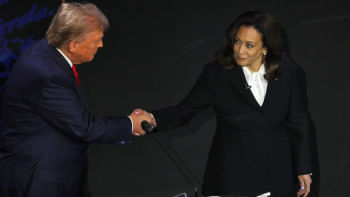Who will win the US elections?

With just a week to go, predictions of "who will win" the knife-edge US presidential elections has become table talk of sorts. Among US nationals, there's a strange aura of burn-out anxiety; a new report by the American Psychological Association (APA) showed that 7 out of 10 adult US citizens feel stressed about the upcoming elections. And with the past four years tainted with two wars, genocides, moral reckonings and increasing polarisation, the US election results will affect lives much beyond its borders.
Polls, as we know, are not always great at predicting results. Even if they were, most polls show that it's a toss-up; Donald Trump and Kamala Harris are essentially at 50-50 if one takes the margin of error into account in the key swing states. Trump has never been this close to any of his previous Democratic rivals in polls in the past two election bids. Polls underrepresented the "hidden" Trump voters in both 2016 and 2020. The presumed lack of knowledge has now led some people to conclude that Trump will win. But it's really just up in the air with many probable outcomes. Trump may very well win, with a landslide even, but so could Harris.
Alternatively, it could be a tight election, with a marginal win for either Harris or Trump. It could be a tie, too, and go up to the House of Representatives, which is majority Republican, so that would mean that Trump will win. Yet, it could be a repeat of the debatable Bush vs Al Gore presidential race in 2000, where a close election result could lead to weeks of recounting and go up to the Supreme Court to be settled.
One reason why it's so difficult to predict the outcome or even form a remotely trustworthy gut instinct is because Trump has somewhat rusted and Kamala Harris has run an unexpectedly centrist campaign, bringing in old school Republicans like Liz Cheney and talking about owning guns more than student debt forgiveness, to win over Republican voters in swing states. By contrast, she has championed populist economic policies like reduced healthcare and housing costs for the middle class.
There's also a black hole regarding strategies deployed by both candidates to mobilise voters. A registered Democrat in Michigan revealed they receive text messages from unknown numbers paid by the "Republican Accountability Pact," where former Trump supporters in Michigan say that they will not be voting for Trump because of the insurrection on January 6, 2021. These strategies, presumably by the Harris campaign, haven't been under the media spotlight as much. The Trump campaign's tendency to use AI and woo voters—such as the fake image of Trump surrounded by Black voters—is more documented, but we still don't know the extent of their disinformation campaign, which previously proved ridiculously successful in convincing many MAGA supporters that the Democratic election of 2020 was rigged.
For resident voters, domestic issues such as the economy and healthcare matter more than foreign policy. But foreign policy is an issue on voters' minds. For example, 70 percent of Trump voters and 54 percent of Harris voters listed it as a major factor for their votes, according to a survey by Pew Research Center in September. Many who deeply care about the genocide perpetrated by Israel, especially Arab Americans who have lost family members in Gaza or Lebanon, also see it as a decisive factor for not voting at all or not voting for Harris, who's been complicit with Biden.
But it must be noted that Arab Americans are not a large enough population in the swing states to drastically affect the outcomes. It could also be that many Arab Americans will still vote for Harris over Trump on the issue of Palestine, as the latter is more favoured by right-wing extremists in Israel and incendiary in his rhetoric against Palestinians. The game changer for Harris would only occur if large numbers of Arab voters along with the youth and Black voters in the swing states decided to vote for Trump or pro-Palestinian independent candidate Jill Stein, or not vote at all.
The national sentiment as a whole is unclear; even the popular vote is up in the air. Trump lost both popular votes against Joe Biden and Clinton, who he defeated in the Electoral College, which historically favours Republicans. Trump has made substantial gains in non-competitive states like New York and California, where Harris, though leading, is underperforming as a Democrat. Republicans also won the House popular vote for the midterm elections in 2022, in less competitive states including California. It is not impossible for Donald Trump to win the popular vote, and it is not impossible for Harris to win the Electoral College but not the popular vote, which just reflects that this election is truly in uncharted waters. It could very well be that it's the 2016 or 2020 movie all over again, but it could also be a different script altogether.
When predicting elections, political scientists historically considered incumbency as an advantage. Between 1986 and 2012, of 14 sitting US presidents seeking re-election, 11 did indeed win. But the US, like most other countries, is in a different era now where the conventional political wisdom does not apply anymore. It's an era of profound political distrust and dissatisfaction. In 2020, anti-incumbency fervour against Donald Trump favoured Joe Biden, especially for the disaster that was Trump's mishandling of the Covid pandemic.
But the incumbency theory cannot be applied in this election either; it's an election between a notorious former president who lost re-election four years ago, and the current questionable vice-president after the incumbent president dropped out. Technically speaking, Kamala Harris is the incumbent as she did not distance herself from the Biden-Harris administration, and failed to address the shortcomings of the current policies to offer people with a new package deal. Biden's track record could work against her. But one can also look at it differently: Harris is a woman of colour, the first female vice-president, and she is not in her 80s. The idea of Kamala Harris as the president of the US offers a fresh image. Yet, this could also work against her as racism and sexism prevail. One can pull out many scenarios, even bizarre ones, and the conversations can go in circles till November 5. The reality is that we will only know the predicted winner only after the maps of Pennsylvania, Michigan and Wisconsin go red or blue.
The uncertainty surrounding a global phenomenon such as the US elections is amplified in the current times, as there's an answer to everything on social media; the mainstream media too, is filled with predictions and probabilities like a game. But despite all these thorough political analyses of all different scenarios, we can still say we just don't know. If one is sure that "Trump will win" or "Harris will win," it is nothing but a guess.
Ramisa Rob is in-charge of Geopolitical Insights at The Daily Star.
We welcome your contributions and analysis of global events, and responses to our articles. To submit articles to Geopolitical Insights, please send an email to [email protected].
Follow The Daily Star Opinion on Facebook for the latest opinions, commentaries and analyses by experts and professionals. To contribute your article or letter to The Daily Star Opinion, see our guidelines for submission.

 For all latest news, follow The Daily Star's Google News channel.
For all latest news, follow The Daily Star's Google News channel. 










Comments